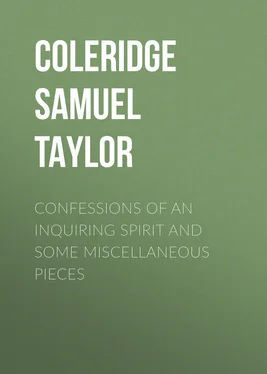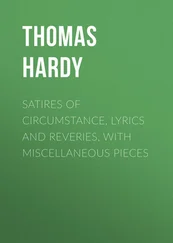Samuel Coleridge - Confessions of an Inquiring Spirit and Some Miscellaneous Pieces
Здесь есть возможность читать онлайн «Samuel Coleridge - Confessions of an Inquiring Spirit and Some Miscellaneous Pieces» — ознакомительный отрывок электронной книги совершенно бесплатно, а после прочтения отрывка купить полную версию. В некоторых случаях можно слушать аудио, скачать через торрент в формате fb2 и присутствует краткое содержание. Жанр: foreign_prose, foreign_religion, Философия, foreign_psychology, foreign_antique, на английском языке. Описание произведения, (предисловие) а так же отзывы посетителей доступны на портале библиотеки ЛибКат.
- Название:Confessions of an Inquiring Spirit and Some Miscellaneous Pieces
- Автор:
- Жанр:
- Год:неизвестен
- ISBN:нет данных
- Рейтинг книги:4 / 5. Голосов: 1
-
Избранное:Добавить в избранное
- Отзывы:
-
Ваша оценка:
- 80
- 1
- 2
- 3
- 4
- 5
Confessions of an Inquiring Spirit and Some Miscellaneous Pieces: краткое содержание, описание и аннотация
Предлагаем к чтению аннотацию, описание, краткое содержание или предисловие (зависит от того, что написал сам автор книги «Confessions of an Inquiring Spirit and Some Miscellaneous Pieces»). Если вы не нашли необходимую информацию о книге — напишите в комментариях, мы постараемся отыскать её.
Confessions of an Inquiring Spirit and Some Miscellaneous Pieces — читать онлайн ознакомительный отрывок
Ниже представлен текст книги, разбитый по страницам. Система сохранения места последней прочитанной страницы, позволяет с удобством читать онлайн бесплатно книгу «Confessions of an Inquiring Spirit and Some Miscellaneous Pieces», без необходимости каждый раз заново искать на чём Вы остановились. Поставьте закладку, и сможете в любой момент перейти на страницу, на которой закончили чтение.
Интервал:
Закладка:
Now, for ‘Pentateuch’ substitute ‘Old and New Testament,’ and then I say that this is the doctrine which I reject as superstitious and unscriptural. And yet as long as the conceptions of the revealing Word and the inspiring Spirit are identified and confounded, I assert that whatever says less than this, says little more than nothing. For how can absolute infallibility be blended with fallibility? Where is the infallible criterion? How can infallible truth be infallibly conveyed in defective and fallible expressions? The Jewish teachers confined this miraculous character to the Pentateuch. Between the Mosaic and the Prophetic inspiration they asserted such a difference as amounts to a diversity; and between both the one and the other, and the remaining books comprised under the tithe of Hagiographa , the interval was still wider, and the inferiority in kind, and not only in degree, was unequivocally expressed. If we take into account the habit, universal with the Hebrew doctors, of referring all excellent or extraordinary things to the great First Cause, without mention of the proximate and instrumental causes—a striking illustration of which may be obtained by comparing the narratives of the same event in the Psalms and in the historical books; and if we further reflect that the distinction of the providential and the miraculous did not enter into their forms of thinking—at all events not into their mode of conveying their thoughts—the language of the Jews respecting the Hagiographa will be found to differ little, if at all, from that of religious persons among ourselves, when speaking of an author abounding in gifts, stirred up by the Holy Spirit, writing under the influence of special grace, and the like.
But it forms no part of my present purpose to discuss the point historically, or to speculate on the formation of either Canon. Rather, such inquiries are altogether alien from the great object of my pursuits and studies, which is to convince myself and others that the Bible and Christianity are their own sufficient evidence. But it concerns both my character and my peace of mind to satisfy unprejudiced judges that if my present convictions should in all other respects be found consistent with the faith and feelings of a Christian—and if in many and those important points they tend to secure that faith and to deepen those feelings—the words of the Apostle, rightly interpreted, do not require their condemnation. Enough, if what has been stated above respecting the general doctrine of the Hebrew masters, under whom the Apostle was bred, shall remove any misconceptions that might prevent the right interpretation of his words.
Farewell.LETTER III
My Dear Friend,
Having in the former two Letters defined the doctrine which I reject, I am now to communicate the views that I would propose to substitute in its place.
Before, however, I attempt to lay down on the theological chart the road-place to which my bark has drifted, and to mark the spot and circumscribe the space within which I swing at anchor, let me first thank you for, and then attempt to answer, the objections—or at least the questions—which you have urged upon me.
“The present Bible is the Canon to which Christ and the Apostles referred?”
Doubtless.
“And in terms which a Christian must tremble to tamper with?”
Yea. The expressions are as direct as strong; and a true believer will neither attempt to divert nor dilute their strength.
“The doctrine which is considered as the orthodox view seems the obvious and most natural interpretation of the text in question?”
Yea, and nay. To those whose minds are prepossessed by the doctrine itself—who from earliest childhood have always meant this doctrine by the very word Bible—the doctrine being but its exposition and paraphrase—Yea. In such minds the words of our Lord and the declarations of St. Paul can awaken no other sense. To those on the other hand who find the doctrine senseless and self-confuting, and who take up the Bible as they do other books, and apply to it the same rules of interpretation—Nay.
And, lastly, he who, like myself, recognises in neither of the two the state of his own mind—who cannot rest in the former, and feels, or fears, a presumptuous spirit in the negative dogmatism of the latter—he has his answer to seek. But so far I dare hazard a reply to the question—In what other sense can the words be interpreted?—beseeching you, however, to take what I am about to offer but as an attempt to delineate an arc of oscillation—that the eulogy of St. Paul is in nowise contravened by the opinion to which I incline, who fully believe the Old Testament collectively, both in the composition and in its preservation, a great and precious gift of Providence;—who find in it all that the Apostle describes, and who more than believe that all which the Apostle spoke of was of Divine inspiration, and a blessing intended for as many as are in communion with the Spirit through all ages. And I freely confess that my whole heart would turn away with an angry impatience from the cold and captious mortal who, the moment I had been pouring out the love and gladness of my soul—while book after book, law, and truth, and example, oracle, and lovely hymn, and choral song of ten thousand thousands, and accepted prayers of saints and prophets, sent back, as it were, from heaven, like doves, to be let loose again with a new freight of spiritual joys and griefs and necessities, were passing across my memory—at the first pause of my voice, and whilst my countenance was still speaking—should ask me whether I was thinking of the Book of Esther, or meant particularly to include the first six chapters of Daniel, or verses 6–20 of the 109th Psalm, or the last verse of the 137th Psalm? Would any conclusion of this sort be drawn in any other analogous case? In the course of my lectures on Dramatic Poetry, I, in half a score instances, referred my auditors to the precious volume before me—Shakespeare—and spoke enthusiastically, both in general and with detail of particular beauties, of the plays of Shakespeare, as in all their kinds, and in relation to the purposes of the writer, excellent. Would it have been fair, or according to the common usage and understanding of men, to have inferred an intention on my part to decide the question respecting Titus Andronicus , or the larger portion of the three parts of Henry VI. ? Would not every genial mind understand by Shakespeare that unity or total impression comprising and resulting from the thousandfold several and particular emotions of delight, admiration, gratitude excited by his works? But if it be answered, “Aye! but we must not interpret St. Paul as we may and should interpret any other honest and intelligent writer or speaker,”—then, I say, this is the very petitio principii of which I complain.
Still less do the words of our Lord apply against my view. Have I not declared—do I not begin by declaring—that whatever is referred by the sacred penman to a direct communication from God, and wherever it is recorded that the subject of the history had asserted himself to have received this or that command, this or that information or assurance, from a superhuman Intelligence, or where the writer in his own person, and in the character of an historian, relates that the word of the Lord came unto priest, prophet, chieftain, or other individual—have I not declared that I receive the same with full belief, and admit its inappellable authority? Who more convinced than I am—who more anxious to impress that conviction on the minds of others—that the Law and the Prophets speak throughout of Christ? That all the intermediate applications and realisations of the words are but types and repetitions—translations, as it were, from the language of letters and articulate sounds into the language of events and symbolical persons?
Читать дальшеИнтервал:
Закладка:
Похожие книги на «Confessions of an Inquiring Spirit and Some Miscellaneous Pieces»
Представляем Вашему вниманию похожие книги на «Confessions of an Inquiring Spirit and Some Miscellaneous Pieces» списком для выбора. Мы отобрали схожую по названию и смыслу литературу в надежде предоставить читателям больше вариантов отыскать новые, интересные, ещё непрочитанные произведения.
Обсуждение, отзывы о книге «Confessions of an Inquiring Spirit and Some Miscellaneous Pieces» и просто собственные мнения читателей. Оставьте ваши комментарии, напишите, что Вы думаете о произведении, его смысле или главных героях. Укажите что конкретно понравилось, а что нет, и почему Вы так считаете.












